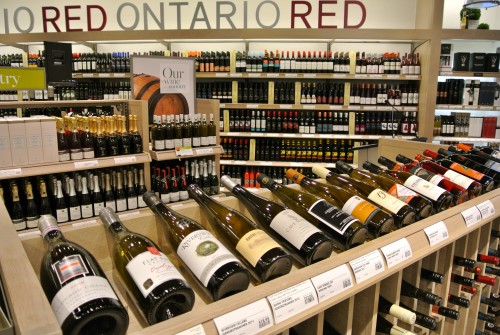 Maybe now Ontario Premier Kathleen Wynne will listen. Maybe, just maybe, this government will pull their heads out of the sand for a minute or two and listen to smart people with even smarter conclusions on why privatization is good for everyone in Ontario.
Maybe now Ontario Premier Kathleen Wynne will listen. Maybe, just maybe, this government will pull their heads out of the sand for a minute or two and listen to smart people with even smarter conclusions on why privatization is good for everyone in Ontario.
A study released today (Wednesday) by the C.D. Howe Institute, and outlined in a Canadian Press story by Maria Babbage, concludes that Ontario would rake in more money from alcohol sales, consumers would pay less for booze and have greater choice of products if the Ontario government opened up booze sales to the private sector.
The study says that Ontario is actually losing revenue by holding a virtual monopoly on the sale of booze.
 That is some sobering news and it should make Wynne very uncomfortable after standing behind the LCBO monopoly since she came into power.
That is some sobering news and it should make Wynne very uncomfortable after standing behind the LCBO monopoly since she came into power.
The C.D. Howe report that was written by two economists, as pointed out by Babbage, points to the Western provinces that have more competition and have 7% more per capita in provincial alcohol profits than those with government-run monopolies, according to the report written by two economists.
The study concludes that it is in the best interests of the Ontario government to allow wine and beer sales in grocery and convenience stores, permit beer to be sold by other retail outlets and grant licences for off-winery stores to wineries and to new wine retailers.
“These changes would increase the choices available and reduce prices for Ontario consumers, as well as improve the competitiveness of Ontario’s smaller wineries and breweries and generate more revenue for the government,” the report said, according the Canadian Press.
Ontario is the only jurisdiction in North America that limits off-site liquor sales to a chain of government stores, a single private beer retailer and a fixed number of off-winery wine stores, the report said.
The LCBO contributes over $2.5 billion into provincial and federal coffers each year with sales from hard liquor as well as beer and wine.
 The Beer Store, the CP story says, run by three foreign-owned brewers, also has a quasi-monopoly of beer sales and retail distribution. It generates about $1 billion for the province in taxes.
The Beer Store, the CP story says, run by three foreign-owned brewers, also has a quasi-monopoly of beer sales and retail distribution. It generates about $1 billion for the province in taxes.
The high costs of the LCBO — including salaries and benefits for employees — are unlikely to shrink without more competition, the report said.
The report points to two large vintners — one owned by U.S.-based Constellation Brands, and the other Canadian-owned Peller Estates — can sell Ontario-blended and VQA wine in retail stores the Wine Shop and the Wine Rack, but can’t undercut LCBO prices. Other wineries, as well as distilleries and brewers, are only able to sell their wares through the LCBO or on site.
That gives the two big wineries a lot more retail shelf space than the other vintners, Derek Saunders, who co-founded the Calamus Estate Winery near Beamsville, told the Canadian Press.
Saunders, like a lot of Ontario winery owners and backed by the Ontario Wine Council, wants to see wine sold in private stores.
A campaign by Ontario wineries, spearheaded by the Ontario Wine Council, lobbied for the privatization or partial privatization of the booze industry but fell on deaf ears during the election campaign Saunders said.
“There’s nobody in government bold enough to make a change that will help this industry,” Saunders said in the CP report.
“And I repeat: this industry will collapse under the current system because we just can’t sell our wine. We can’t get it to the people.”
The LCBO has been convincing governments for decades that the monopoly is the only answer for the retailing booze in the province, citing social responsibility as its main argument against privatization.
But the report’s authors note that rather than discouraging alcohol sales, the LCBO publishes brochures touting various wines, beers and spirits.
The report notes that “the quasi-monopoly enjoyed by the LCBO and TBS (The Beer Stores) imposes excessive costs on consumers, restricts their menu of choices, and limits the accessibility of stores selling retailing alcohol.
“In addition, it imposes distortions on small domestic breweries and wineries and puts them at a competitive disadvantage relative to a few large Canadian and foreign producers.”
This is a study that should get the full attention of the Liberal government. It’s not the first report to recommend privatization, but it comes at a fairly good time with the Liberals just taking power and able to make tough decisions without it hurting at the polls.
Whether or not Wynne has the stomach to get into a war with the powerful union standing behind employees of the LCBO is a much more crucial question.
It will be interesting to see how this report plays out in the mainstream press.
Meanwhile, the Ontario Wine Council has chimed in on the C.D. Howe report, saying the institute’s call for major change in Ontario’s alcohol retailing system agrees with the council’s position that lack of competition is resulting in less choice for consumers and reduced government revenues.
The WCO says it has developed a model, based on substantial research, for the introduction of private wines shops in Ontario which would operate parallel to the LCBO. The “Pairs Perfectly” proposal, outlined here www.pairsperfectly.com, addresses all of the concerns raised in the Howe report with respect to consumer choice and maximizing government revenue to support priority public services.
“The C.D. Howe Institute is on the same page as the Wine Council of Ontario, in calling for greater choice and convenience for consumers. Our model offers the best solution for change in a way that delivers a win for all concerned — consumers, the LCBO and government — in a socially responsible manner,” said Allan Schmidt, chair of the Wine Council of Ontario.
The “Pairs Perfectly” model envisions a network of privately operated wine shops across the province which would be retail customers of the LCBO’s wholesale distribution arm, similar to the beverage alcohol system in British Columbia.
“We will continue to urge the Ontario government to work with us to modernize and improve retail opportunities for Ontarians to better be able to enjoy the products of our province’s outstanding wine regions,” Schmidt said.
“Consumers have been clear with us. They want change in the way wine is sold in Ontario, but they want to see it done in a way that is complementary to the LCBO and we agree. Ontarians deserve the opportunity to have additional selection and the kind of shopping experiences that residents of other provinces enjoy.”






Comment here